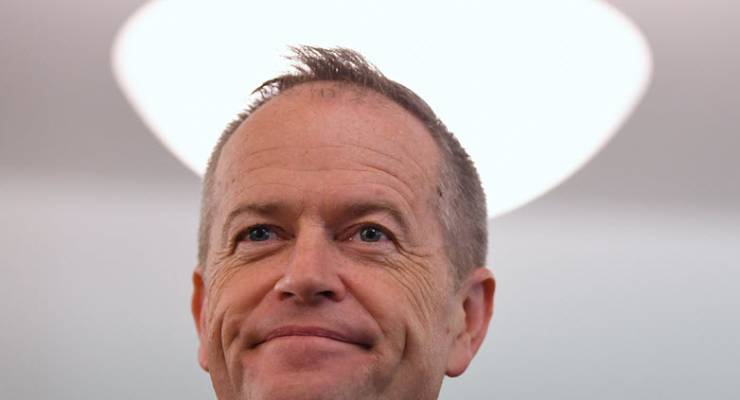
Last week, amid the swirling furore that is the ATO tax scandal, Labor leader Bill Shorten issued a media release claiming the matter was further evidence of the need for a Senate inquiry into the establishment of a national integrity commission.
People who want a federal ICAC — and there are many — would have nodded sagely, confident the Labor leader was on their side.
It wasn’t the first time Shorten had indicated such support. He’d also mentioned it in the last days of the 2016 federal election campaign, when the Supreme Court found former NSW Labor MP Eddie Obeid guilty of misconduct in public office.
In an effort to inoculate federal Labor MPs with NSW electorates from a voter backlash, Shorten said he was supportive of an incoming Labor government reconvening the previous Parliament’s Senate committee that was “investigating the value and the benefit and the pros and cons of a national integrity commission”.
Shorten then kicked off the new year calling for the same Senate inquiry, using the resignation from cabinet of former health minister Sussan Ley to call for an “open and honest discussion” about the need for a federal ICAC.
But let’s be clear, Shorten and Labor support a Senate inquiry into the merit of the proposal, but they have not actually committed to establishing a national integrity commission. There is nothing to suggest Bill Shorten or the Labor caucus actually want a federal ICAC, and quite a few pointers to the contrary.
A motion proposed at the ALP’s most recent national conference in 2015, which called for Labor to adopt a national ICAC-type body as policy, was quietly dropped from the agenda due to lack of support from Labor MPs.
[When did the batshit right start to sound so left wing (and vice versa)?]
The party’s spokesman for such matters at the time, Gary Gray, reportedly said: “An ICAC-type body is needed where there is a lack of institutions to protect the integrity of public processes and the public interest. This is not the case federally. Although the need for an ICAC-type body has been discussed for 30 years, the ALP has always rejected a federal ICAC while supporting and reviewing existing integrity measures.”
While it might be tempting to cry “that was then, this is now,” a perusal of Hansard will show that Labor MPs are still trotting out variations of Gray’s argument, but now under the cover of the Senate inquiry.
Labor Senator Jacinta Collins spoke earlier this year against a Greens’ proposal to establish a federal ICAC, arguing the private members’ bill was “stale and obsolete”.
The Senator, who was deputy chair of the previous Parliament’s Senate inquiry into a national integrity commission, noted that while “Labor does not rule out that in the future a dedicated federal anticorruption body may be required,” the party’s “final position on the value and merits of establishing a national integrity commission should not be considered until the completion of this inquiry”.
Collins then argued “it is clear that there is a lot more work still to do before serious consideration can be given to whether some form of anticorruption commission should be established at a federal level to complement existing anticorruption and integrity bodies and, if so, how such a body should operate”.
After commending the previous inquiry’s interim report, as well as Labor’s proposal to re-establish the inquiry, Collins concluded: “Labor is open to the idea that a dedicated federal anticorruption body may be required but, at this stage, a case for one has not been made.” (emphasis added).
[Bill Shorten’s new donations push just an act of political theatre]
This would explain why Labor has voted with the Coalition to shut down parliamentary stunts to “establish” a federal ICAC, such as that brought on by the Greens to expand the building union regulator, the ABCC, into an ICAC-type body.
The reconstituted Senate inquiry was established earlier this year. It is now taking evidence on the merits of a national integrity commission and will report by 15 August.
It would be foolish to assume the now-Labor led inquiry will unambiguously recommend the establishment of a national integrity commission. Given Labor’s historic opposition to a federal ICAC, the caveats currently being expressed by Labor MPs in parliament, and Shorten’s reluctance to give outright support to such an entity, the committee will more likely conclude there are adequate measures against corruption at the federal level.
In reality, the Senate inquiry proposal was a vehicle for Shorten and Labor to ride the wave of popularity for the concept past the Obeid conviction to polling day. And now that the opposition has taken charge of the inquiry, its report will provide Labor with the cover it needs to avoid voter opprobrium when the much-vaunted federal ICAC is dismissed as unnecessary.








“Casper Shorten honours his rhetoric”? That would be spooky.
What have they got to hide – beside their own habits?
There is a lot of supposition in this article…why not wait until the inquiry is complete, and then drop a bucket on Bill Shorten and the Labor Party if they don’t come up with the goods?
IMHO this writer has been mixing with the Lieberals a little too long. No one tells as many porkies as they do!!!!!
Crikey please issue a disclaimer that the writer is a well known tory.
Is this issue even discussed in the Liberal Party?
Disappointing that Crikey still gives Paula a gig at all…..attempted balance I suppose, but wasted effort.
The last thing either T1 or T2 pollies want is an effective agency to discomfort them.
As with strong FoI, though they may mewl about the need for such legislation whilst in Opposition, that changes when the bums shift to the other side of the table and get to lean on the Despatch Box.
The first reference to a federal ICAC should be bumBoil Shlernt for his selling out of union members during his risen-without-trace career of bumbling ineptitude & toadying to BigBi$.
So?? What’s the surprise? The govt sure doesn’t. Write and whinge about them. Shorten is in opposition not Govt. They’re the ones you should be bagging more so.